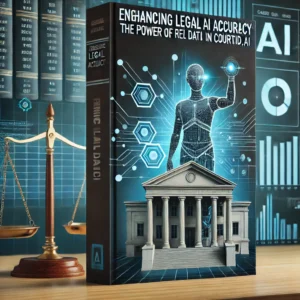In the ever-evolving landscape of artificial intelligence, the application of machine learning models in the legal domain has gained significant traction. One such innovative player in this field is CourtAid.ai, a company that harnesses the power of real court data to provide accurate and reliable legal information. In contrast to conventional open AI models, CourtAid.ai sets itself apart by eliminating the potential for misinformation and hallucination, ensuring a higher level of precision, especially in the context of Australian law.
OpenAI’s GPT-3.5 architecture has proven to be a powerful tool, but one of its inherent challenges lies in the tendency to generate responses based on general patterns when faced with unfamiliar queries. This sometimes results in the model fabricating information, a phenomenon known as hallucination. CourtAid.ai addresses this issue head-on by utilizing databases of authentic court data, offering a unique and effective solution to enhance the reliability of legal AI.
One of the primary advantages of CourtAid.ai’s approach is the commitment to transparency. Unlike traditional open AI models that might provide inaccurate or invented responses when faced with data gaps, CourtAid.ai’s models are programmed to signal when information is not available. This eliminates the risk of misleading users and allows for a more trustworthy user experience. Users can have confidence that the responses they receive are based on actual legal precedents and court decisions, adding a layer of reliability crucial in the legal domain.
Let’s delve into a practical example to illustrate the impact of CourtAid.ai’s methodology. Consider a user seeking information on a specific aspect of Australian contract law. A traditional open AI model might generate a response based on general legal principles, potentially leading to inaccuracies. In contrast, CourtAid.ai, drawing from its extensive database of Australian court cases, would provide a response grounded in real-world legal scenarios. Moreover, if the query falls outside the available data, the system would transparently communicate this limitation, ensuring users are aware of any gaps in information.
The specificity of CourtAid.ai’s legal insights is a result of its tailored focus on Australian law and court cases. Traditional open AI models lack the geographical and contextual nuances necessary to provide region-specific legal information accurately. By narrowing its scope to Australian law, CourtAid.ai ensures that users receive information that is not only legally sound but also relevant to the jurisdiction in question. This targeted approach is particularly valuable for legal professionals, researchers, and individuals seeking precise information within the Australian legal framework.
Furthermore, the incorporation of real court data enhances the depth and richness of the information provided by CourtAid.ai. The models learn from actual case outcomes, precedent-setting decisions, and the intricacies of legal arguments presented in court. This real-world grounding ensures that the AI responses are not only accurate but also reflective of the complexities inherent in legal practice.
As the legal landscape evolves, the demand for accurate and reliable legal AI solutions continues to grow. CourtAid.ai’s innovative use of real court data sets a new standard for precision in legal information retrieval. By addressing the challenges associated with hallucination in traditional open AI models, CourtAid.ai not only provides a more trustworthy platform for legal research but also contributes to the overall improvement of AI applications in the legal domain. As the company continues to refine and expand its database, the potential impact on legal professionals and researchers in Australia is significant, ushering in a new era of precision and reliability in legal AI.
